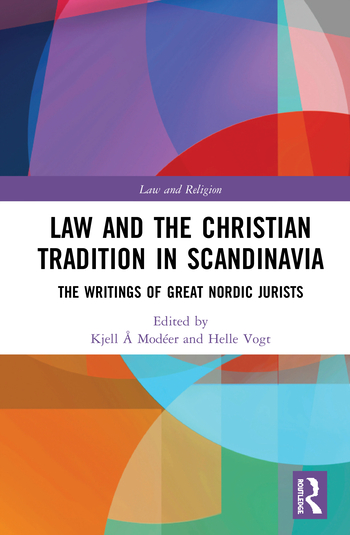
Law and the Christian Tradition in Scandinavia: The Writings of Great Nordic Jurists
edited by
Kjell Å Modéer and Helle Vogt
This volume is part of a 50-volume series on “Great Christian Jurists in World History,” presenting the interaction of law and Christianity through the biographies of 1000 legal figures of the past two millennia. Commissioned by the Center for the Study of Law and Religion at Emory University, each volume in this series focuses on a specific country, region, or era, and it samples the life and work of a score or more of its greatest legal minds over the centuries. These legal minds include not only civil and canon lawyers and judges but also theologians, philosophers, and church leaders who contributed decisively to legal ideas and institutions, or who helped create landmark statutes, canons, or cases. Thus, familiar Christian jurists like Gratian, Grotius, Blackstone, Kuttner, and Scalia appear in this series, but so do Augustine, Isidore, Aquinas, Calvin, Barth, Maritain, and Romero. This biographical approach is not intended to deprecate institutional, doctrinal, social, or intellectual histories of law, nor will it devolve into a new form of hagiography or hero worship of dead white males. It is instead designed to offer a simple method and common heuristic to study the interaction of law and Christianity around the world over the past two millennia.
Columbia University Press opened this series in 2006 with a three-volume work on Modern Christian Teachings on Law, Politics, and Human Nature, featuring thirty modern Catholic, Protestant, and Orthodox Christian figures. Cambridge University Press has new titles on great Christian jurists in the first millennium, as well as in English, Spanish, French, Lowlands, and American history. Routledge is taking up the Italian, Nordic, Russian, Welsh, and Latin American stories; Mohr Siebeck the German story; Federation Press the Australian story. Forthcoming titles will cover great Christian jurists in the history of Scotland, Ireland, Austria, Switzerland, Greece, Poland, and various countries and regions in Eastern Europe, central Eurasia, the Middle East, and parts of Africa and Asia.
Foreword by John Witte, Jr.
A decade ago, Sweden’s leading legal historian, Kjell Å Modéer, helped lead a team of Scandinavian scholars in the publication of a pathbreaking study titled Law & Religion in the 21st Century — Nordic Perspectives. That welcome volume introduced the English-speaking world to the richness and diversity of current Scandinavian understandings of church and state, society and politics, faith and freedom, religion and rights, family and education, and more. It was a surprise for some readers to learn about the growing disestablishment of Lutheranism and the growing separation of church and state in some Nordic lands. It was also a surprise to learn that this region — long known as Europe’s leader in cultural secularization, social experimentation, and institutional innovation — was now blossoming with new legal life “growing in the ruins” of traditional Christian ideas and institutions.

While that first volume presciently mapped the future of law and religion in Scandinavia in the third millennium, this new volume expertly maps the interaction of law and religion in the second millennium. Here, the focus is not on the new green shoots of law and legal theory sprouting among the ruins of Christian monuments in Finland, Sweden, Denmark, Norway, and Iceland. The focus is rather on the monumental growth of public, private, penal, and procedural law and legal theory that emerged when Christianity ruled Scandinavia as the established religion, and church and state cooperated in the governance of Christian realms.
In this volume, Professor Modéer has teamed up with Denmark’s top legal historian, Helle Vogt, in leading two dozen distinguished scholars in a fresh interdisciplinary study of some of the greatest Scandinavian architects of law and Christianity from the twelfth through the twentieth centuries. The editors have judiciously commissioned case studies of a score of Catholics and Lutherans, canonists and civilians, Pietists and Romantics, churchmen and statesmen, theologians and jurists, natural lawyers and historical schoolmen whose lives and work collectively shaped and reshaped the interaction of law and religion in Nordic history.
Much of this material will be new to Anglophone readers. A few Reformation specialists will recognize the names of such Lutheran pioneers as Johannes Bugenhagen, Olavus and Laurentius Petri, and Niels Hemmingsen. A few constitutional historians might know the groundbreaking legal and political work of Nikolaj Grundtvig, Absalon Taranger, and Frede Castberg. But many other figures who come to light and life in these pages deserve to be better known. For example, though I know a bit about the history of criminal law, I was chastened to learn for the first time about the remarkable reforms of nineteenth century criminal law initiated on overtly Christian terms by leading Finnish jurist, Karl Gustav Ehrström. While I knew of Dietrich Bonhoeffer and other German Lutheran resistance writers against Nazism, the extraordinary and sacrificial work of resistance by contemporary Norwegian Lutheran Bishop Eivind Berggrav was a special revelation. Though the work of famous Nordic legal realist Alf Ross was standard reading when I was in law school, I have never heard of Swedish ecclesiastical lawyer, Göran Göransson, whose legal theory seems so much more creative and sustaining.
Kjell Modéer and Helle Vogt have rendered great service in inviting and integrating the efforts of such a wide range of Nordic scholars of law, history, theology, philosophy, and ethics – from seasoned veterans to young scholars of sterling promise. They have arranged their biographical case studies into five main eras – with several representative figures each drawn from the high middle ages; the Reformation and early modern period; the age of Enlightenment and the rise of secular law in Christian societies; the nineteenth-century rise of national romanticism and constitutionalism; and the age of secular modernity. A sweeping introduction provides a master narrative of law and Christianity throughout Scandanavian history in the second millennium. This volume is the first such comprehensive history of law and religion in Scandinavian context, and other readers will enjoy finding similar treasures and discoveries in these pages. ♦

John Witte, Jr., JD (Harvard); Dr. Theol. h.c. (Heidelberg), is Robert W. Woodruff Professor of Law, McDonald Distinguished Professor of Religion, and director of the Center for the Study of Law and Religion at Emory University. A specialist in Legal History, Human Rights, Religious Freedom, Marriage and Family Law, Law and Religion, he has published 280 articles, 17 journal symposia, and 35 books.
Recommended Citation
Witte, Jr., John. “Law and the Christian Tradition in Scandinavia edited by Kjell Å Modéer and Helle Vogt.” Canopy Forum, October 15, 2020. https://canopyforum.org/2020/10/15/law-and-the-christian-tradition-in-scandinavia/

